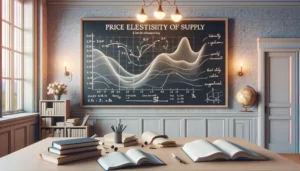The spending multiplier is a fundamental concept in Keynesian economics, playing a crucial role in understanding how income and expenditure interact to influence Gross Domestic Product (GDP). This concept sheds light on the impact of government spending and other forms of expenditure on the overall economy, particularly in times of economic fluctuation.

✅ AI Essay Writer ✅ AI Detector ✅ Plagchecker ✅ Paraphraser
✅ Summarizer ✅ Citation Generator
The Essence of the Spending Multiplier
At its core, the multiplier concept revolves around how a change in spending, particularly government spending, can lead to a proportionally larger change in GDP. This relationship is central to Keynesian economics, which emphasizes the role of aggregate demand in driving economic activity.
Multiplier Effect on GDP
The multiplier effect indicates that an increase in spending, whether by consumers, businesses, or the government, results in an increase in total economic output. For instance, an initial increase in government spending (AE0) can lead to a greater overall increase in GDP (Y0 to Y1). This is because one person’s spending becomes another person’s income, which in turn is spent, creating a chain reaction that amplifies the initial expenditure.
Keynesian View on Expenditure
Keynesian economics posits that in times of economic downturn, increased government spending can help in boosting economic activity. The expenditure multiplier thus becomes a tool for policymakers to estimate the effects of fiscal policies on GDP.
Calculating the Multiplier
The spending multiplier is calculated as the ratio of the change in GDP to the change in spending. It’s an indicator of the economy’s sensitivity to changes in spending and helps in understanding the potential impact of fiscal policies.
The Role of Equilibrium
In Keynesian economics, equilibrium is achieved when aggregate expenditure equals total output. The multiplier effect plays a significant role in reaching this equilibrium, especially during economic adjustments.
Spending and Income-Expenditure Model
The income-expenditure model in Keynesian economics illustrates how changes in spending can affect the overall economy. An increase in spending leads to a higher level of income and consumption, further stimulating economic activity.
Government Spending and the Multiplier
Government spending is a key component in the application of the spending multiplier. The government can influence economic activity through its fiscal policies, using the multiplier effect to stimulate growth or control inflation.
The impact of government spending on GDP is magnified by the multiplier:
- A strategic increase in government expenditure can significantly raise the overall economic output, especially in a sluggish economy.
- However, the use of government spending as a tool must be balanced carefully. Excessive spending can lead to inflationary pressures, while insufficient spending might not adequately stimulate the economy.
Changes and Adjustments in the Economy
The concept of the spending multiplier is particularly relevant in times of economic changes and adjustments. It provides a framework for understanding how different levels of spending affect economic growth and stability.
The economy’s responsiveness to changes in spending, as measured by the multiplier, is crucial in formulating effective fiscal policies. Policymakers must consider the current state of the economy when deciding on spending changes.
Adjusting fiscal policies according to the multiplier effect can help in achieving desired economic outcomes, such as increased employment, higher production, and economic stability.
Conclusion: The Significance of the Spending Multiplier
The spending multiplier is a vital concept in Keynesian economics, offering insights into the relationship between expenditure and GDP. It highlights the significance of government spending in influencing economic activity and provides a quantitative tool for policymakers. Understanding and effectively utilizing the spending multiplier is key in managing economic fluctuations and driving growth, making it an indispensable element in the realm of economic policy and analysis.
FAQ
Follow us on Reddit for more insights and updates.





Comments (0)
Welcome to A*Help comments!
We’re all about debate and discussion at A*Help.
We value the diverse opinions of users, so you may find points of view that you don’t agree with. And that’s cool. However, there are certain things we’re not OK with: attempts to manipulate our data in any way, for example, or the posting of discriminative, offensive, hateful, or disparaging material.